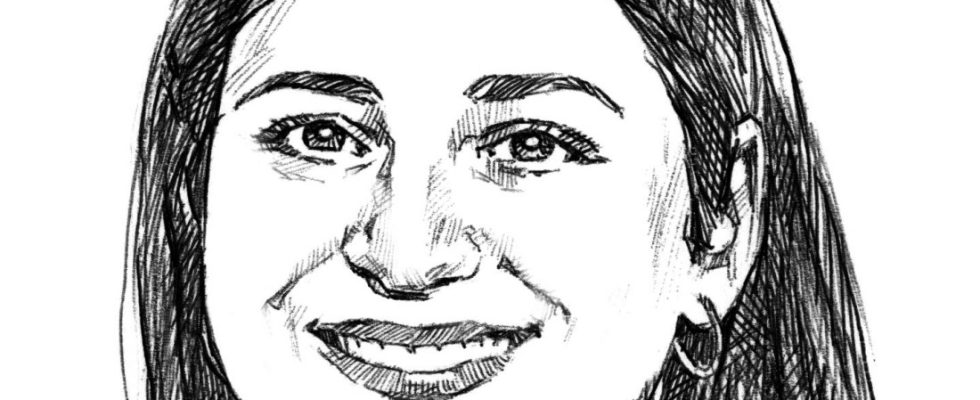It was with great surprise that I discovered Ukrainian perfumes for myself. I am very grateful to Olga Bogorodchenko for this, because she recently presented her fragrance creations at an event in Munich. Olga is a hobby perfumer, but with great dedication. She likes to share her skills and knowledge with others. For example, at an event on the Ukrainian Independence Day. There she raised many donations for the organization “Gen.Ukrainian”, which helps children to overcome war trauma.
Olga Bogorodchenko reports on the history of Ukrainian perfumes in the Ukrainian community in Munich.
(Photo: antaninaphoto.com/en)
Olga has lived in Munich since 2014, she studied at the Technical University and has been working here ever since. She is a young mother and says that her child motivated her to support “Gen.Ukrainian”. Olga is no stranger to war, although they have lived in Munich for a long time. Like me, her parents lived in Kiev until the Russian invasion of our country. Luckily they were able to escape to their daughter.
Olga’s love for perfumes developed by chance. She works for a company that develops fragrances for the food and chemical industries, including cosmetics. Olga fell in love with the fragrances and now she surprised the Ukrainian community with all her knowledge – from the history of Ukrainian perfumes to a small aroma tour through Munich.
The audience found out that Patrick Süskind, author of the bestseller “Perfume”, was born near Munich and as a student often visited the Café Hügel on Maximilianstrasse. Or that a perfume brand that is also represented in Munich produces exclusive fragrances that John F. Kennedy and Ernest Hemingway wore.
As a Ukrainian, I naturally have a special interest in fragrances from my homeland. The history of Ukrainian perfumery is actually not entirely new. In the former Soviet Union, for example, the Ukrainian perfumer Nina Zeyskaya created the famous “Indian Sandal” fragrance, which sold millions and is still on the market.
The modern history of Ukrainian perfumes begins around 2014, when new brands of perfumes appeared. You can’t train as a perfumer in Ukraine, so most of them are self-taught – “and still talented and successful,” says Olga. However, the rules and standards for fragrances developed in Ukraine are less strict than in the European Union. Therefore, the perfumers would have more freedom to develop individual fragrances.
Manoli perfumes, for example, are largely made without additives. The bottles are often exclusive, they are hand-painted by an artist. GParfums creates futuristic fragrances, I know Bibliothèque perfumes from the Ukraine. The brand is feminist, the founder is a woman and almost all employees were women. Unfortunately, the company had to give up its headquarters in Kharkiv because the city is constantly being bombed. Now it is produced in Italy – in cooperation with an Italian perfumer.
SZ columnist Emiliia Dieniezhna is particularly taken with the fragrance “Freedom” by Ukrainian perfumer Ann Sokolova.
(Photo: antaninaphoto.com/en)
But the SKLVA brand has conquered my heart, both with its history and with the fragrances. Ann Sokolova from Kiev created unisex perfumes. When the war started, she had to stay in a bunker for a long time. She took everything she needed to make her perfumes with her into the bunker, but she couldn’t work there. Then many Ukrainians started sharing on social media that they put Sokolova’s perfumes in their emergency kits to show that the scents are important to them. This gave new inspiration to Ann Sokolova, who created the fragrance “Freedom”.
The perfume smells like black earth after the rain and has airy notes of ozone, which is said to symbolize the spirit and strength of the Ukrainian people. With this fragrance I will celebrate the victory of Ukraine.
Emiliia Dieniezhna, 35, fled from Kiev with her then four-year-old daughter Ewa Pullach near Munich. She works voluntarily for the non-governmental organization NAKO, which aims to fight corruption in Ukraine. She also teaches German to Ukrainian refugee children. Once a week she writes a column for the SZ about her view from Munich on the events in her home country.

